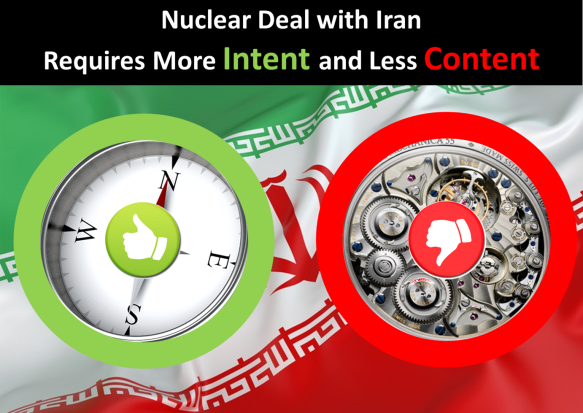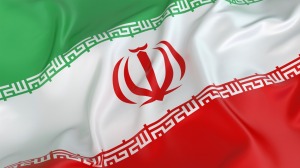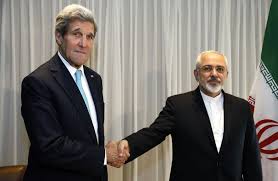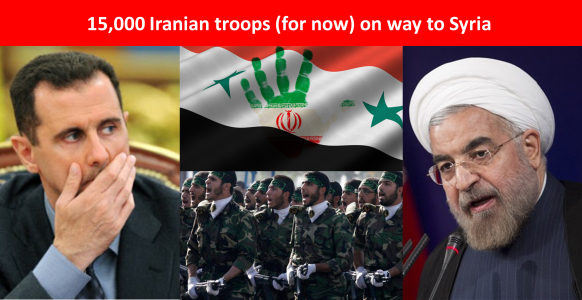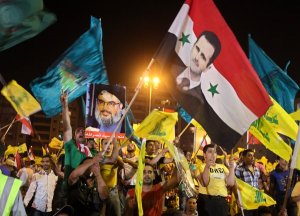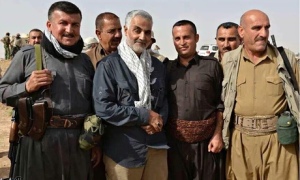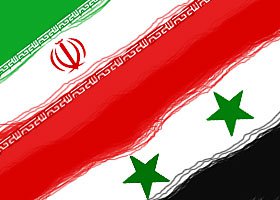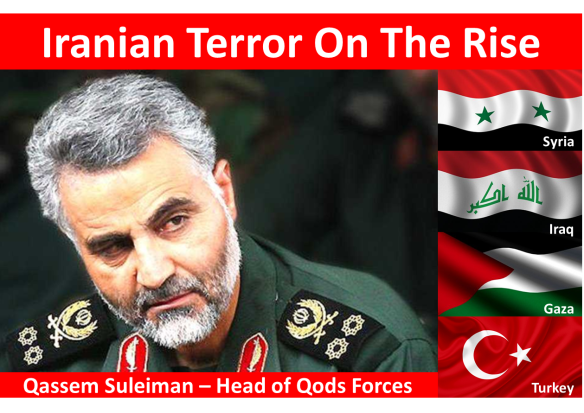
Tehran wants to export its Islamic Revolution and, in doing so, build an empire based on its Islamic Revolution of 1979.
Some might scoff at this statement, judging it a bombastic conspiracy theory. It certainly does sound bombastic and had such a statement been said by non-Iranians, or even Iranian dissidents, one might agree that it sounds too much like a conspiracy theory.
Unfortunately, for whoever views such an aspiration as a danger (and fortunately for all the others), “Exporting the Revolution” is not only ingrained within the ideals of the Islamic Revolution itself, it is evidently the ambitious inspiration of many Iranian leaders who are proud to point out to successes in exporting the revolution to neighboring countries. It’s worth listening to the rhetoric of these leaders: their words speak volumes about Tehran’s long-term vision of a Global Islamic Awakening with Tehran at its center.
The Adviser: Tehran’s Regional “Revolutionary Nations”
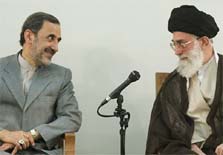 The latest Iranian leader to add some fuel to this growing bonfire of revolutionary aspirations is none other than Supreme Leader Khamenei’s right hand man- Akbar Velayati: While discussing the role of Iran in the region during the Munich Security Conference in Tehran, he pointed out that Lebanon, Iraq, Syria, Yemen and Bahrain are “revolutionary nations”. His choice of words is no accident and neither is his choice of countries. All of these countries have, to some degree, been sold on the Tehran’s Islamic Revolution and by lumping them together as “revolutionaries” reveals Tehran’s ambitions:
The latest Iranian leader to add some fuel to this growing bonfire of revolutionary aspirations is none other than Supreme Leader Khamenei’s right hand man- Akbar Velayati: While discussing the role of Iran in the region during the Munich Security Conference in Tehran, he pointed out that Lebanon, Iraq, Syria, Yemen and Bahrain are “revolutionary nations”. His choice of words is no accident and neither is his choice of countries. All of these countries have, to some degree, been sold on the Tehran’s Islamic Revolution and by lumping them together as “revolutionaries” reveals Tehran’s ambitions:
- Lebanon has been under the influence of Tehran’s since 1982, with the birth of Iran’s proxy Shiite Hezbollah, culminating in the economic and military treaty signed between the two countries in 2008.
- Iraq fell under Tehran’s influence in 2005 with the election of al-Maliki, a pro-Shiite/Tehran and anti-US president, who opened Baghdad’s doors to Iran.
- Syria’s fall under the influence of Iran was on a slow burner until the civil war broke out in 2011 and Tehran pledged its political, financial and military support to Assad.
- Tehran’s influence over Yemen took form in its support for the Shiite Houthi rebels to successfully overthrow the Yemenite government in 2014 which subsequently led to Saudis openly fighting in Yemen.
- Bahrain is interesting in this context since it is far from being under Tehran’s influence, not because Tehran isn’t trying but because the ruling government of Bahrain is fighting off Tehran’s influence to this day.
By categorizing all of these countries together, from satellite states such as Lebanon to states suffering from Iranian efforts at subversion such as Bahrain, one can understand that Tehran’s plan for “Exporting the Revolution” has gone from one country (Lebanon) to the region (the so-called Shiite Crescent).
The Mullah: The Greater Iranian Empire
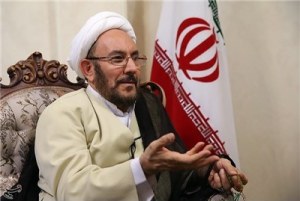 Earlier this year, Ali Younesi, a senior advisor to President Rouhani, spoke glowingly about a greater Iranian empire from the borders of China to the Persian Gulf with Baghdad at its center. His statement drew harsh responses from Baghdad and strengthened the accusations against Tehran’s empirialistic aspirations. Younesi quickly came under fire internally and went on the record to claim that he was misunderstood: he only spoke of a “historical and cultural unity” and did not imply a nationalistic unity between Iran and any other countries. Iranian leaders such as President Hassan Rouhani, Iran’s parliament chief, Ali Larijani, and Iran’s FM Javad Zarif joined the “lost in translation” theme and went out of their way to try to convince the world that Tehran has no empirical ambitions and respects the national identity of its neighbors.
Earlier this year, Ali Younesi, a senior advisor to President Rouhani, spoke glowingly about a greater Iranian empire from the borders of China to the Persian Gulf with Baghdad at its center. His statement drew harsh responses from Baghdad and strengthened the accusations against Tehran’s empirialistic aspirations. Younesi quickly came under fire internally and went on the record to claim that he was misunderstood: he only spoke of a “historical and cultural unity” and did not imply a nationalistic unity between Iran and any other countries. Iranian leaders such as President Hassan Rouhani, Iran’s parliament chief, Ali Larijani, and Iran’s FM Javad Zarif joined the “lost in translation” theme and went out of their way to try to convince the world that Tehran has no empirical ambitions and respects the national identity of its neighbors.
Although Younesi may have been misunderstood, but the context of his statement is important: he spoke about unifying all of these countries in the region in order to protect them from “Islamic extremism, takfirism, atheism, neo-Ottomans, the Wahhabis, the West and Zionism”. Clearly, this isn’t only a question of “history and culture” but is in fact a political and military unity against the enemies of Tehran and its Islamic Revolution.
The Soldier: The De Facto Iranian Leader
 Whether politicians in Tehran or in any neighboring countries support or deny the revolutionary ambitions, one man’s presence in all of these countries is key to understand the military dimension beyond the words and ideas. That man is Iran’s Qods chief Qassam Suleimani.
Whether politicians in Tehran or in any neighboring countries support or deny the revolutionary ambitions, one man’s presence in all of these countries is key to understand the military dimension beyond the words and ideas. That man is Iran’s Qods chief Qassam Suleimani.
Suleimani is rightfully deemed the most influential military leader in Iran, even more powerful than the chief of the IRGC, Mohammad Ali Jafari. While Jafari remains in Iran, Suleimani is in charge Iran’s “extraterritorial military and clandestine operations” and he continuously pops up in Beirut, Baghdad and Damascus where he has his own offices and network of Iranian and local military personnel. Wherever Suleimani goes, an increase in Tehran’s military influence follows because, as Suleimani himself has said: “I Qassem Suleimani, manage Iranian policy in Iraq, Lebanon, Gaza and Afghanistan. The Iranian ambassador in Iraq is a member of the Quds forces, and whoever replaces him will also be a Quds Force man“.
Suleimani’s power is legendary and his local “partners” are in awe of him: Who else could shout “the Syrian army is useless! Give me one brigade of the Basij, and I would conquer the whole country” and still remain alive in Syria?
As Assad’s future became bleaker and the nuclear deal between the P5+1 and Iran was inked, it was Suleimani who flew to Moscow twice, despite UN sanctions against his flying abroad, to clinch the Russian support for Assad and the resulting military involvement by the Russians in Syria.
Without Suleimani’s military might, one might be excused to believe the Iranian denials of an empire and accept Younesi’s feeble “historical and cultural unity” statement. But Suleimani isn’t in Lebanon, Syria and Iraq for “historical and cultural” reasons – he is there to increase Tehran’s influence in the region, and in doing so, is creating the groundwork for “Exporting the Revolution” to all the countries he controls.
The Politician: Tehran’s “Global Vocation”
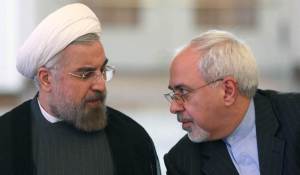 The ideal of “Exporting the Revolution” was devised by none other than the hero of the Islamic Revolution, Khomeini, as part of Iran’s constitution to “support the just struggle of the mustazafun (the oppressed) against the mustakbirun (the arrogant) in every corner of the globe”. It is an essential part of Iran’s revolutionary goals, goals which are taken very seriously in Tehran as Zarif wrote in his book: “Without revolutionary goals we do not exist …our revolutionary goals are what distinguish us from other countries.”
The ideal of “Exporting the Revolution” was devised by none other than the hero of the Islamic Revolution, Khomeini, as part of Iran’s constitution to “support the just struggle of the mustazafun (the oppressed) against the mustakbirun (the arrogant) in every corner of the globe”. It is an essential part of Iran’s revolutionary goals, goals which are taken very seriously in Tehran as Zarif wrote in his book: “Without revolutionary goals we do not exist …our revolutionary goals are what distinguish us from other countries.”
Zarif went on to explain Tehran’s special raison-d’aitre in the region: Tehran, he claims, has a “viewpoint that has the potential to be projected globally and change the international order”. It is this “viewpoint” that drives Tehran to look beyond its borders to fulfil Khomeini’s vision. The fact that many of these countries’ governments don’t want to accept this “revolution” nor want to change the “international order” is irrelevant even to a politician such as Zarif: the revolution comes before all other ideals.
The Supreme Leader: Tehran Leads a Global Islamic Awakening
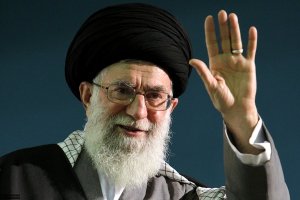 No one embodies the spirit of the Islamic Revolution as much as Iran’s Supreme Leader, Ali Khamenei. Khamenei, who repeatedly chooses to call himself a revolutionary, as opposed to a politician, makes no qualms about fulfilling the ideal of “Exporting the Revolution” nor its goals: A Global Islamic Awakening that will include an “uprising against global and international dictatorships (Israel/US)” who have “humiliated the Islamic Ummah as much as they could” that will culminate in a “century of Islam” – Khameini doesn’t limit his vision to the region…he’s going global.
No one embodies the spirit of the Islamic Revolution as much as Iran’s Supreme Leader, Ali Khamenei. Khamenei, who repeatedly chooses to call himself a revolutionary, as opposed to a politician, makes no qualms about fulfilling the ideal of “Exporting the Revolution” nor its goals: A Global Islamic Awakening that will include an “uprising against global and international dictatorships (Israel/US)” who have “humiliated the Islamic Ummah as much as they could” that will culminate in a “century of Islam” – Khameini doesn’t limit his vision to the region…he’s going global.
Although this may sound, like all the other over-ambitious Iranian leaders quoted here, as the simplistic rants of a religious extremist, the power of the Supreme Leader mingled with the inherent riches of Iran’s energy sources significantly increase the possibility of trying to turn this rant into a reality.
Khamenei, the revolution is the top priority in times of war and in times of peace: The jihad to achieve these goals is, according to him, “endless because evil and its front continue to exist… this battle will only end when the society can get rid of the oppressors’ front with America at the head of it, which has expanded its claws on human mind, body and thought“. But even in times of peace, such as the period that is sure to follow the nuclear deal, Khamenei wants to Iran to keep its revolutionary ideals: peace with the West is dangerous since it will lead to a war that will force Iran to “put aside its revolutionary philosophy until it loses its power” – How? “The enemy’s effort to have influence is one of the big threats…an economic and security influence are of course dangerous and have heavy consequences, but a political and cultural influence is a much larger danger and everyone must be careful”.




